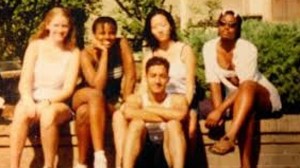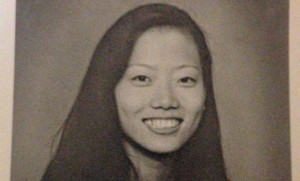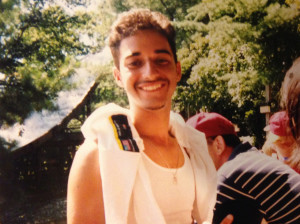
Like so many others, I spent the last few months of 2014 listening – first avidly, then with trepidation and ultimately with disdain – to the hit podcast Serial. The podcast follows a single story, week by week. The story centers on Adnan Syed, a Pakistani American high school student who was accused and convicted of murdering his girlfriend, Hae Min Lee, in 1999 when they were both students at Baltimore’s Woodlawn High School. The journalist Sarah Koenig is the investigator and narrator of each episode, unraveling clues in each episode to one end: Did Adnan really do it?
This past Tuesday brought another development in Adnan’s case. Asia McClain, Adnan’s alibi, wrote an affidavit in which she states that she was indeed with Adnan at the library after school (during the time of Hae’s murder). Further, she asserts that she never recanted her testimony that provided Adnan an alibi, despite the prosecutors’ claims to the contrary. All this, is bringing Serial, Adnan and the case back into the media after a few weeks of relative silence.
So much has been written about Serial, the journalistic ethics of such an endeavor, the believability of any and all the parties involved and, of course, on the question of whodunit. Adnan Syed is currently incarcerated for this crime, having spent the past 15 years in prison, and faces an upcoming appeal. It’s also a matter of debate as to whether the podcast will help or hurt his appeal. Like almost everyone I know who listened to the podcast, I, harbor strong opinions on all these matters, but those are not the reason I bring it here. My aim is not to litigate the actual events of the story, whether I believe particular characters and what I think should happen with Adnan’s appeal. There are many, many other articles which address these questions.

The deep welling of anxiety in me is not simply a matter of discomfort with a white journalist’s gaze into several different communities of color that is at the core of the show. It’s more than that. I despair over the story and the storytellers – the fact that this case, and this telling of it, has reached so many ears. A young Korean American woman dies. A young Pakistani American man is charged with the murder. Her family and community are almost completely absent from the podcast. Aside from a caricature of her as a “typical” teenager presented via a few words from her diary, her voice is absent. I can only recall one portion of one episode, out of 12, devoted to sharing any of her character, her depth, her humanity. Yet another tale about a beautiful dead girl.
Adnan is in a precarious position, knowing that the podcast is reaching so many, and navigating a minefield of potential consequences given his participation in it. His Pakistani American community is discussed by Koenig with a slapdash pseudo-anthropological perspective and always, always from a place of difference. Adnan’s community is portrayed as insular, mysterious, curious, and in several instances, suspicious. She vacillates in her characterization of Adnan, mostly thinking of him as a “nice guy” and occasionally pondering whether he had it in him to strangle his ex-girlfriend in cold blood. Koenig casually does several of her own psychological assessments of whether everything she’s heard about Adnan might shed some light on some lurking violent tendencies within him. Whether he might be the kind of teenager who could kill his ex.

The subject of Adnan and Hae’s relationship is a recurring theme. Was he the jealous type? Had she moved on after breaking up with him, sending him into a rage? What were the pressures put on them by their parents (who didn’t know they were dating)? Koenig’s exasperation and incredulity when she learns about the challenges of dating in a South/Asian American immigrant family is so ridiculously out of touch with the second-generation immigrant experience, it made me wonder if she knows any children of immigrants at all. She is incredulous when Adnan reveals that his parents didn’t know about his dating life, and neither did Hae’s. She gapes when he describes some of the challenges they both faced in concealing the relationship, and in worrying about how their parents would react if they found out. I often wonder what any of this has to do with Adnan’s propensity to murder. I imagine hundreds and thousands of listeners hearing this tale, this tale of communities so much like mine, and seeing only difference, only a shallow excavation of who we are and who these families might have been.
Serial is also the story of a young woman of color gone too soon. And I cringe at how little of her voice and story seem to matter. Violence against transgender and cisgender women of color is an epidemic. The bizarrely flip centrality of Hae’s murder is rather despicable in this context. In the context of an unjust judicial system this story is important. Koenig’s treatment of these communities matters because the truth is not simply a journalistic curiosity, there are lives at stake.
In the course of her investigation, the first suspect Koenig steers the audience towards is a young Black man, Jay, a friend of both Hae and Adnan. So many dynamics of race and criminality are at play here, with almost none of them explicitly addressed in course of the podcast, save for a gesture of acknowledgement about some of these dynamics in an episode, late in the series, about Adnan’s trial and jury. Koenig mentions that Adnan was convicted in Baltimore but doesn’t do much more than gesture toward race here, implying that the jury in that city might have been more sympathetic to Jay than Adnan. Further, the pivot to Jay as a suspect early in the series is loaded with racial codes implicit and explicit (his being from a different part of town than his friends, the first alternative suspect to Adnan, that he sold drugs). The discussion of the jury make-up is loaded as well. None of these racial dynamics are explicitly addressed in the podcast. If Jay’s story is unconvincing to Koenig, then this is worth investigating, but without a clear conversation about how race and criminality affect her reading of Jay and the entire criminal justice system, this process is reckless at best, and deeply harmful and racist at worst.
Let’s turn back to Adnan for a moment: at times, Koenig’s belief in Adnan’s innocence seems bound up in the mythology of the model minority. How could such a nice boy, one so popular, family-oriented and studious be a cold-blooded killer? The pieces don’t fit. Then of course the uncritical racialized questions about his anger emerge. Could he have been the type to get so angry he might kill? Was he just another angry, young Muslim? Jilted and enraged? It doesn’t seem so to Koenig, yet she asks these questions repeatedly. Over and over again she wonders about Adnan’s potential secret rage. In one episode, Koenig plays us audio of the prosecutors seeking to convict Adnan, asserting that he shouldn’t get bail because his Pakistani American family might just ship him off to Pakistan with some mysteriously gotten funds. We hear Adnan’s family for a few moments in this episode, lamenting their attorney’s fees and generally fretting about the well-being of their son, who they believe is innocent. We hear them for just a few minutes, but I hear the fatigue in their voices. This trial occurred before September 11, 2001 so the word “terrorist” is missing from these conversations, but the suspicion of criminality is not.
I listened through to the end of Serial. At its close, I was only left with more questions. Based on Koenig’s investigations it’s hard to understand Adnan’s conviction. It is no small accomplishment to sift through so much information and offer us a narrative about these kids from Woodlawn High School and what happened to one of them in 1999. Koenig has opened up this conversation for us all to have and given us some insight into what seems like a deeply flawed judicial process. For anyone who’s been reading Rabia Chaudry’s (a family friend of Adnan) blog with its dozens of primary documents from the trials, it’s hard to think that due process was met and Adnan was justly convicted.
So, Koenig did indeed tell us a compelling story. But let’s not forget that she told from her perspective, it’s woefully incomplete, and that there are some real questions about impact and ethics that her approach raises. More than all that, when Serial ended I was left wondering if we’ll ever know Hae’s story; if we’ll ever know her as more than collateral in a story about these young men. Will Adnan ever be able to tell his story? Will Hae’s parents and Adnan’s parents ever tell theirs? Will we ever get to see these stories without the foggy lens of racialized difference?
I hope so.

Try the single episode serial on BBC called BLACK MIRROR.